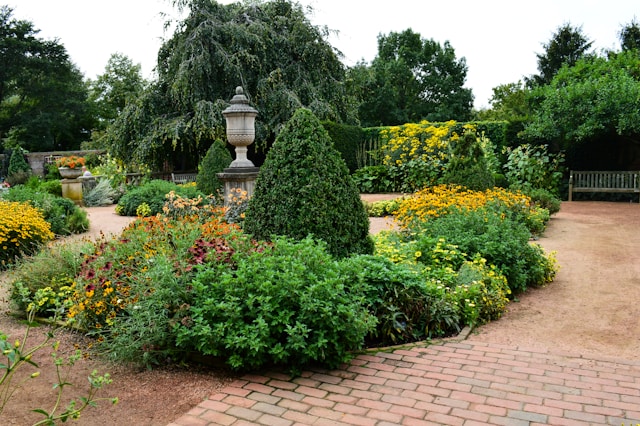- Professional landscaping enhances curb appeal, creating strong first impressions that attract customers and clients.
- It adds value to commercial properties while improving safety, usability, and tenant satisfaction.
- A well-maintained landscape supports branding, promotes sustainability, and gives businesses a competitive edge.
First impressions matter, especially in the competitive world of commercial real estate. A property’s exterior is often the first thing a customer, tenant, or investor notices—and it can set the tone for every interaction that follows. A well-maintained and thoughtfully designed landscape does more than just look appealing; it signals professionalism, care, and attention to detail. For commercial property owners and managers, investing in professional landscaping services can lead to far-reaching advantages that go beyond simple aesthetics.
How Professional Landscaping Helps
Professional landscaping transforms spaces into functional, attractive environments that influence the way people perceive a business. Whether it’s a corporate office park, retail center, medical facility, or industrial complex, consistent landscape maintenance and enhancements can have a significant impact on customer experience, employee satisfaction, and overall business value. Here are the many benefits of professional landscaping for commercial properties:
Enhanced Curb Appeal and First Impressions
The appearance of a commercial property speaks volumes before a word is ever exchanged. A landscape with clean lines, seasonal plantings, trimmed hedges, and tidy walkways instantly establishes credibility. Visitors and clients subconsciously form opinions about a company based on what they see before they enter the building.
If the exterior is disorganized or neglected, they may assume the business operates with similar inefficiency. On the other hand, a vibrant and welcoming landscape projects competence and professionalism. Professional landscapers understand how to design and maintain a site that complements the architecture of the building and reflects the business’s identity. They use color, texture, and symmetry to create inviting entrances and communal spaces that elevate the visual experience.
Even small touches like updated flower beds, sculpted trees, and decorative planters can go a long way in enhancing a company’s image. For businesses that rely heavily on foot traffic or customer-facing interactions, an attractive exterior can play a pivotal role in drawing people in and encouraging them to stay.
Improved Tenant and Employee Satisfaction
Commercial landscaping is not just about impressing potential clients—it also plays an important role in supporting the well-being of the people who occupy the space every day. Tenants and employees benefit from access to clean, green environments that offer a sense of comfort and connection to nature.
Outdoor seating areas, shaded walkways, and landscaped courtyards create inviting spaces for breaks, meetings, and casual gatherings. These spaces encourage social interaction and provide natural opportunities for stress relief during the workday. Green environments contribute to higher levels of employee satisfaction and productivity. Natural elements such as trees, flowers, and water features have calming effects that promote mental clarity and reduce fatigue.
Tenants are more likely to renew leases when they feel proud of their surroundings and enjoy the ambiance of the property. In turn, property managers can reduce tenant turnover and foster stronger community relationships by investing in professional landscape enhancements. Well-maintained outdoor spaces support a culture of care and help businesses attract top talent and loyal customers.
Safety and Security Enhancements
Landscaping is also a strategic tool for enhancing safety and security on commercial properties. Properly designed and maintained landscapes help eliminate visual obstructions and reduce the potential for accidents or criminal activity. Overgrown shrubs or poorly lit areas can create hiding spots and increase the risk of unwanted incidents.
With a professional landscaping team, properties can implement site-specific strategies to improve visibility, guide foot traffic, and reduce liability. Pathways, steps, and ramps must remain clear and stable year-round to prevent slips and falls. Professional landscapers ensure these areas are free from debris, ice, and uneven surfaces that could lead to injuries. They also select plantings that grow in controlled patterns, reducing the risk of roots damaging pavement or blocking security cameras.
Well-placed lighting, trimmed hedges, and open sightlines make a property feel safer and more welcoming at all hours of the day. Landscaping is an often-overlooked part of a comprehensive safety plan, but it plays a vital role in reducing risk and protecting both property and people.
Increased Property Value

A professionally landscaped commercial property stands out in the marketplace. In real estate, appearances matter, and beautifully maintained grounds can add considerable value to the property. Landscaping is often one of the first improvements that appraisers notice, and it can influence both immediate value and long-term appreciation. Investors and prospective buyers are more likely to place a premium on properties that show signs of thoughtful and consistent care.
Unlike interior updates that may become outdated quickly, landscaping offers timeless appeal when properly designed and maintained. A mature tree canopy, for example, not only improves curb appeal but also contributes to energy savings by providing natural shade.
Walkways, retaining walls, patios, and green spaces serve as functional and aesthetic features that appeal to tenants and visitors alike. When property managers commit to regular landscaping services, they help preserve the property’s structural integrity and reduce deferred maintenance costs, which makes the asset more attractive in a competitive real estate market.
Environmental and Sustainability Benefits
Sustainability has become a key priority for businesses and property owners looking to reduce their environmental impact and meet regulatory requirements. Professional landscaping offers multiple opportunities to create environmentally responsible outdoor environments.
By using native plants, drought-tolerant species, and efficient irrigation systems, commercial landscapes can reduce water usage and support local ecosystems. These low-maintenance, climate-appropriate choices result in fewer resources needed for upkeep and a reduced environmental footprint. Stormwater management is another crucial benefit of sustainable landscaping.
Permeable paving materials, rain gardens, and bioswales help direct and absorb runoff, reducing the strain on municipal systems and preventing erosion. These techniques not only support healthier soil and water quality but can also help properties qualify for sustainability certifications like LEED. Trees and vegetation also absorb carbon dioxide and help filter air pollutants, making outdoor areas cleaner and healthier for everyone.
A commitment to eco-friendly landscaping sends a strong message about corporate responsibility. Clients and employees are increasingly drawn to businesses that align with their values, and sustainable design elements help create positive brand associations. Over time, these environmentally conscious choices can lead to operational savings and increased goodwill within the community.
Branding and Professional Image
In the business world, perception can be just as important as performance. Landscaping is a powerful tool for reinforcing brand identity and projecting a polished, professional image. Whether a property hosts retail stores, corporate offices, or healthcare facilities, the landscape can serve as an extension of the brand’s voice. Carefully selected design elements—from plant choices to hardscape materials—can mirror a company’s style, values, and culture.
For instance, a tech company might opt for a clean, modern look with minimalist plantings and geometric paving. A wellness center might feature tranquil gardens, water elements, and shaded seating areas. Even seasonal flower arrangements and decorative displays can reinforce a company’s attention to detail and commitment to customer experience. Signage beds, entryways, and gathering spaces offer opportunities for branding through colors, textures, and layout.
A professional landscaper works collaboratively with property managers and business owners to ensure the design aligns with brand goals and site conditions. The result is a cohesive look that communicates excellence and consistency. A landscape that reflects a company’s professionalism and vision can leave a lasting impression on clients and build trust over time.
Cost Efficiency and Maintenance Savings over Time
Some property owners hesitate to invest in professional landscaping due to perceived costs, but in reality, this investment often leads to long-term savings. When landscaping is handled by trained professionals, the results are not only more attractive but also more efficient. Routine maintenance prevents small problems from turning into costly repairs. For example, regular pruning can prevent damage from overgrown branches, while proper irrigation management avoids overwatering and soil erosion.
Landscaping professionals implement strategies to extend the lifespan of plantings, paving, and structural elements by using high-quality materials and proven techniques. They also schedule services to align with seasonal needs, ensuring optimal plant health and reduced waste. In climates with extreme weather patterns, proactive planning and storm preparedness can minimize property damage and expedite recovery after severe conditions.
Energy savings also play a role in cost efficiency. Strategic placement of trees and shrubs can create natural shade that reduces indoor cooling costs during the summer. Windbreaks and foundation plantings can help insulate buildings during colder months. Over time, these passive energy solutions contribute to more manageable utility expenses. By investing in professional landscaping, commercial property owners gain a proactive approach that delivers savings while maintaining a high standard of presentation.
Competitive Advantage in the Market
Commercial properties face increasing competition for tenants, clients, and buyers. In a crowded market, professional landscaping provides a tangible advantage that helps properties stand out. A well-maintained and visually appealing exterior can be the deciding factor for a business to choose a location or for a customer to decide where to shop or dine.
In real estate, aesthetics often influence perceived value, and potential tenants or buyers tend to equate visual appeal with quality service and professionalism. Businesses that operate within attractive, welcoming environments are more likely to leave a positive impression on their own customers.
For retail centers and mixed-use properties, this can result in increased foot traffic and higher sales. For office parks and industrial spaces, it means greater tenant satisfaction and longer lease terms. Professional landscaping communicates that the property is actively managed and cared for, which builds confidence among stakeholders and the surrounding community.
Marketing materials also benefit from attractive exteriors. Photos used for promotional purposes, websites, and social media perform better when the property’s landscaping enhances its appeal. A strong visual identity supports leasing efforts and strengthens relationships with brokers and agents. In every way, professional landscaping contributes to a competitive edge that sets commercial properties apart from the rest.
Ready to elevate the look, value, and function of your commercial property? At Patriot Landscaping & Excavating, we specialize in creating professional, high-impact landscapes that make a lasting impression. Contact us today to learn how we can help you transform your commercial space into a standout destination.

